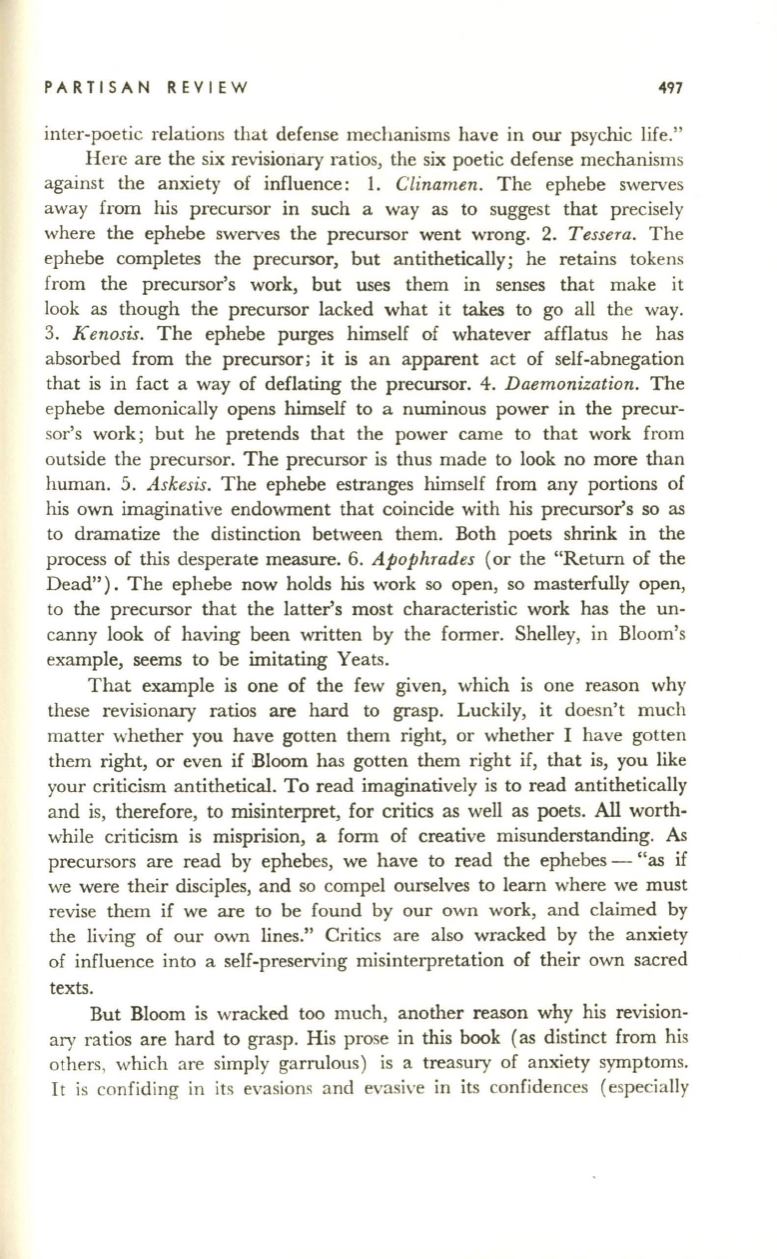
PARTISAN
REVIEW
497
inter-poetic relations that defense mechanisms have in our psychic life."
Here are the six revisioriary ratios, the six poetic defense mechanisms
against the anxiety of influence:
1.
Clinamen.
The ephebe swerves
away from his precursor in such a way as to suggest that precisely
where the ephebe swerves the precursor went wrong. 2.
Tessera.
The
ephebe completes the precursor, but antithetically; he retains tokens
from the precursor's work, but uses them in senses that make it
look as though the precursor lacked what it takes to go all the way.
3. Kenosis.
The ephebe purges himself of whatever afflatus he has
absorbed from the precursor; it
is
an apparent act of self-abnegation
that is in fact a way of deflating the precursor. 4.
Daemonization.
The
ephebe demonically opens himself to a numinous power in the precur–
sor's work; but he pretends that the power came to that work from
outside the precursor. The precursor is thus made to look no more than
human. 5.
Askesis.
The ephebe estranges himself from any portions of
his own imaginative endowment that coincide with his precursor's so as
to dramatize the distinction between them. Both poets shrink in the
process of this desperate measure. 6.
Apophrades
(or the "Return of the
Dead"). The ephebe now holds his work so open, so masterfully open,
to the precursor that the latter's most characteristic work has the un–
canny look of having been written by the former. Shelley, in Bloom's
example, seems to be imitating Yeats.
That example is one of the few given, which is one reason why
these revisionary ratios are hard to grasp. Luckily, it doesn't much
matter whether you have gotten them right, or whether I have gotten
them right, or even if Bloom has gotten them right if, that is, you like
your criticism antithetical. To read imaginatively is to read antithetically
and is, therefore, to misinterpret, for critics as well as poets. All worth–
while criticism is misprision, a form of creative misunderstanding.
As
precursors are read by ephebes, we have to read the ephebes - "as if
we were their disciples, and so compel ourselves to learn where we must
revise them if we are to be found by our own work, and claimed by
the living of our own lines." Critics are also wracked by the anxiety
of influence into a self-preserving misinterpretation of their own sacred
texts.
But Bloom is wracked too much, another reason why his revision–
ary ratios are hard to grasp. His prose in this book (as distinct from his
others, which are simply garrulous) is a treasury of anxiety symptoms.
I
t
is confid ing in its evasions and evasive in its confidences (especially


